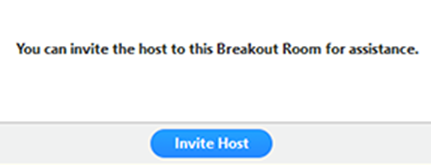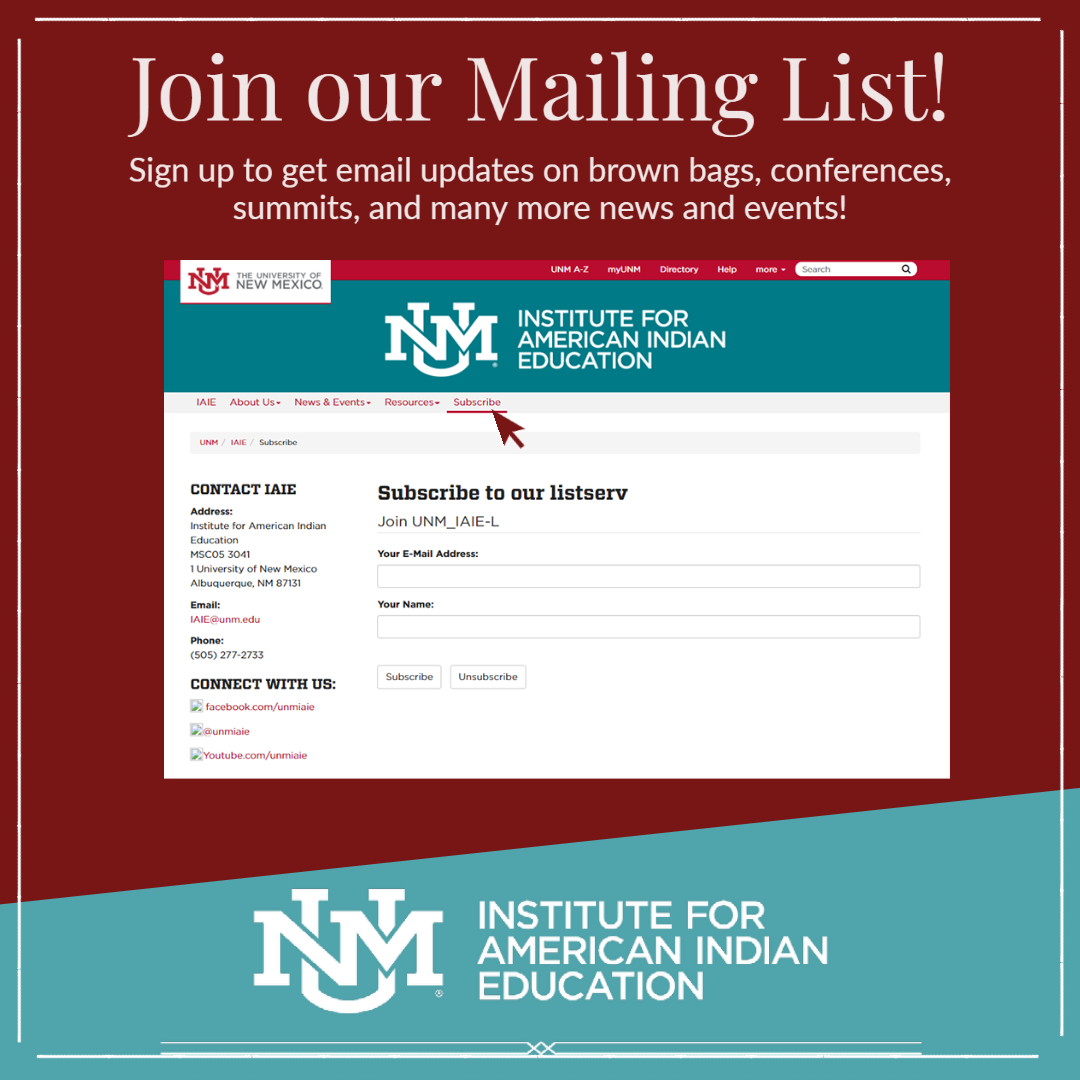2021 IERC Presenters
Refer to the listing below to view specific papers, panels, and workshops. Click the presentation title to read a brief abstract or click the download option if available.
— Download Presentation — Join Session — Watch Recording — Visit Website
Keynote: A Perspective of Navajo Adult Prisoners on their Educational Experience: An Examination of the School to Prison
Delores Greyeyes, Ph.D T
This will add to the lack of research on the incarceration of Navajo males and their educational experiences, to understand our Navajo men’s stories and perspectives support the debates surrounding the ‘school to prison pipeline, to hear about their educational perspectives, and to include the Navajo men’s stories about how we can improve the educational systems.
Paper: Navajo Nation’s Response to the Yazzie-Martinez Case: Implications for Navajo Nation’s Educational Sovereignty
Alexandra Kinsella
Patricia Gonnie
Dr. Kalvin White T
This paper analyzes the meaning of Navajo educational sovereignty and how it is impacted by state public schools operating on and off the Navajo reservation. It will discuss past actions by the New Mexico Public Education Department to close down schools and mention the Navajo Nation’s authority over schools that opened during the COVID-19 pandemic. In addition, the paper will analyze the legal tools available to the Navajo Nation to support its authorities over the education of Navajo students, both on and off the reservation. Ultimately, the paper will examine the potential path forward for Navajo Nation Educational sovereignty, exploring the Navajo Nation’s options for reclaiming control over the provision of education of all Navajo students on the Navajo Nation. This legal analysis will provide a context for the future of education for Native students in New Mexico.
Panel: Meeting Students and Community Where They Are At: A Critical Discussion of TCU Educators Pandemic Pedagogies and Methodologies for Academic Survivance
Jodi Burshia
Joshua Frank Cardenas
Danielle Lansing
Matthew Jake Skeets T
The main impetus for this panel is to share the primary struggles, needs and successes experienced by TCU faculty and staff, especially in relation to the transition into a pandemic protocol and approach to teaching and learning that is principally performed virtually. Each of the panelists teaches different subjects at three different southwestern TCU’s: Southwestern Indian Polytechnic Institute, Dine College, and California Indian Nations College. SIPI is a federal installation, staffed primarily by Native individuals, with a native advisory board but federal control, hierarchy, funding, etc.. Dine college is the first TCU founded in the U.S., formerly Navajo Community College, and is governed by the Navajo Nation and funded variously. SIPI and Dine College are accredited by the Higher Learning Commission. CINC is a new TCU funded by the Twenty-Nine Palms Band of Mission Indians and is in the process of attaining full accreditation. The panelists will focus on three main areas: institutional and community-based approaches, instructional design and delivery, as well as personal strategies that meet students and the community where they are at. Some of these strategies include promoting indigenous and culturally-sustaining practices while creatively adapting to virtual learning and teaching. The panelists will end with a hopeful discussion focused on the positives of the pandemic for teaching and learning at TCU’s.
Workshop: Indigenous Voice and Space in the Acequia & Land Grant Education Project
Adrian Sandoval
Glenabah Martinez T
The Acequia and Land Grant Education (ALGE) project is intended to convene educators, community leaders, and other key stakeholders to develop and provide recommendations to the public education department and higher education department on how to reshape New Mexico's educational system to include a culturally relevant curriculum that includes the topic of acequias and land grants. Such an endeavor cannot be undertaken without the voice of our Indigenous communities. The facilitation of this session will create a space for participants to provide recommendations specific to this project, consider the implications for local teacher preparation programs, and ponder their own future personal and professional roles in reference to this topic.
This presenter wanted to directly provide a presentation that emphasized a specific population who, undoubtedly, epitomizes this theme. Educators, especially teachers, continue to embrace change by accepting uncertainty and relying on their resiliency, courage, and community to mitigate any adverse challenges. Despite unanimous changes occurring almost daily within education, teachers willfully rely on their ambition to ensure their delivery to students is exceptional. The presenter could not think of a stronger reason to bring educators together to talk about the realities of COVID, the classrooms, and cogitate for more advantageous educational opportunities.
Workshop: Halloween, a Season for Racist Costumes at Cameron University
Shay Hernandez
Heather Towne
Cornel Pewewardy
The purpose of this workshop is to unfold the lessons of colonialism to combat cultural appropriation and racism at Cameron University ignited by a racist Halloween incident in 2020.
Panel: Diné Language Teacher Institute Cohort
Vincent Werito
Tiffany Lee
Melvatha Chee
Michelle Whitestone
Cheryl Yazzie
Sarah Adeky-Henio T
The purpose of this panel presentation is to provide information about the Diné Language Teacher Institute cohort program. The DLTI cohort consists of Navajo language teachers from across New Mexico, Arizona, and Utah. The panel will include a brief overview of the cohort’s goals to support Diné language cohort members through ongoing, sustained professional learning via college courses, Summer/Winter Language Institutes and Family Immersion Camps, onsite instructional support and curriculum development. Further, the panel will showcase the DLTI cohort members’ voices as language educators as they talk about their successes and challenges in meeting the goals of the DLTI project.
Workshop: Ethnic Studies Collectives as Sources of Growth, Support, and Healing
Ricardo Medina, Ph.D.
Ratha Kelly, M.A.
Brian Batugo T
Learn about the design, delivery, and outcomes of K-12 Ethnic Studies Collectives that focus on community building, Ethnic Studies frameworks, Indigenous-rooted curriculum and pedagogy, and resource sharing. These collectives welcome all educators and inspire hopeful outcomes for district-wide/ site-based implementation of Ethnic Studies, while offering a healing-centered model for professional development.
Panel: Promoting Solidarity for Social Justice and Indigenous Educational Sovereignty in the Cuba Independent School District
Leola Tsinnajinnie Paquin
Vincent Werito
Shiv Desai
Nancy Lopez T
In this panel, the presenters will use storytelling of partnership efforts with Cuba Independent School District to weave together approaches to solidarity for Indigenous educational sovereignty and community well-being amidst the backdrop of the COVID 19 and racial injustice pandemics.
Educational institutions continue to step cautiously considering decolonization of current pedagogies. Shirley's (2017) case study through what she identifies as Indigenous Social Justice Pedagogy can help us to explore what it might mean to put decolonization into practice. As an Indigenous scholar, I too, place my language in this presentation, as a way of asserting my sovereign right to self-determination by speaking my Diné language, practicing my Diné culture, and sharing my Diné way of understanding the world as was taught to me through ancestral oracy.
Panel: Building STEM capacity in indigenous nations: Research, Practice, and Future Plans
Juliana Taken Alive
AnnMaria De Mars
Christy Hanson
Maria Burns Ortiz
Diné identity in the twenty-first century is distinctive and personal. It is a mixture of traditions, customs, values, behaviors, technologies, worldviews, languages, and lifeways. It is a holistic experience. Diné identity is analogous to Diné weaving: like weaving, Diné identity intertwines all of life’s elements together. This presentation will discuss the following Diné identity markers: Diné baa hane’ (Navajo history), Sa’ą́h Naagháí Bik’eh Hózhǫ́ǫ́n (harmony), Diné Bizaad (language), K’é (relations), K’éí (clanship), and Níhi Kéyah (land).
Recorded Sessions
Keynote: A Perspective of Navajo Adult Prisoners on their Educational Experience: An Examination of the School to Prison
Delores Greyeyes, Ph.D
This will add to the lack of research on the incarceration of Navajo males and their educational experiences, to understand our Navajo men’s stories and perspectives support the debates surrounding the ‘school to prison pipeline, to hear about their educational perspectives, and to include the Navajo men’s stories about how we can improve the educational systems.
Paper: Navajo Nation’s Response to the Yazzie-Martinez Case: Implications for Navajo Nation’s Educational Sovereignty
Alexandra Kinsella
Patricia Gonnie
Dr. Kalvin White
This paper analyzes the meaning of Navajo educational sovereignty and how it is impacted by state public schools operating on and off the Navajo reservation. It will discuss past actions by the New Mexico Public Education Department to close down schools and mention the Navajo Nation’s authority over schools that opened during the COVID-19 pandemic. In addition, the paper will analyze the legal tools available to the Navajo Nation to support its authorities over the education of Navajo students, both on and off the reservation. Ultimately, the paper will examine the potential path forward for Navajo Nation Educational sovereignty, exploring the Navajo Nation’s options for reclaiming control over the provision of education of all Navajo students on the Navajo Nation. This legal analysis will provide a context for the future of education for Native students in New Mexico.
Panel: Meeting Students and Community Where They Are At: A Critical Discussion of TCU Educators Pandemic Pedagogies and Methodologies for Academic Survivance
Jodi Burshia
Joshua Frank Cardenas
Danielle Lansing
Matthew Jake Skeets
The main impetus for this panel is to share the primary struggles, needs and successes experienced by TCU faculty and staff, especially in relation to the transition into a pandemic protocol and approach to teaching and learning that is principally performed virtually. Each of the panelists teaches different subjects at three different southwestern TCU’s: Southwestern Indian Polytechnic Institute, Dine College, and California Indian Nations College. SIPI is a federal installation, staffed primarily by Native individuals, with a native advisory board but federal control, hierarchy, funding, etc.. Dine college is the first TCU founded in the U.S., formerly Navajo Community College, and is governed by the Navajo Nation and funded variously. SIPI and Dine College are accredited by the Higher Learning Commission. CINC is a new TCU funded by the Twenty-Nine Palms Band of Mission Indians and is in the process of attaining full accreditation. The panelists will focus on three main areas: institutional and community-based approaches, instructional design and delivery, as well as personal strategies that meet students and the community where they are at. Some of these strategies include promoting indigenous and culturally-sustaining practices while creatively adapting to virtual learning and teaching. The panelists will end with a hopeful discussion focused on the positives of the pandemic for teaching and learning at TCU’s.
Workshop: Indigenous Voice and Space in the Acequia & Land Grant Education Project
Adrian Sandoval
Glenabah Martinez
The Acequia and Land Grant Education (ALGE) project is intended to convene educators, community leaders, and other key stakeholders to develop and provide recommendations to the public education department and higher education department on how to reshape New Mexico's educational system to include a culturally relevant curriculum that includes the topic of acequias and land grants. Such an endeavor cannot be undertaken without the voice of our Indigenous communities. The facilitation of this session will create a space for participants to provide recommendations specific to this project, consider the implications for local teacher preparation programs, and ponder their own future personal and professional roles in reference to this topic.
This presenter wanted to directly provide a presentation that emphasized a specific population who, undoubtedly, epitomizes this theme. Educators, especially teachers, continue to embrace change by accepting uncertainty and relying on their resiliency, courage, and community to mitigate any adverse challenges. Despite unanimous changes occurring almost daily within education, teachers willfully rely on their ambition to ensure their delivery to students is exceptional. The presenter could not think of a stronger reason to bring educators together to talk about the realities of COVID, the classrooms, and cogitate for more advantageous educational opportunities.
Workshop: Halloween, a Season for Racist Costumes at Cameron University
Shay Hernandez
Heather Towne
Cornel Pewewardy
The purpose of this workshop is to unfold the lessons of colonialism to combat cultural appropriation and racism at Cameron University ignited by a racist Halloween incident in 2020.
Panel: Diné Language Teacher Institute Cohort
Vincent Werito
Tiffany Lee
Melvatha Chee
Michelle Whitestone
Cheryl Yazzie
Sarah Adeky-Henio
The purpose of this panel presentation is to provide information about the Diné Language Teacher Institute cohort program. The DLTI cohort consists of Navajo language teachers from across New Mexico, Arizona, and Utah. The panel will include a brief overview of the cohort’s goals to support Diné language cohort members through ongoing, sustained professional learning via college courses, Summer/Winter Language Institutes and Family Immersion Camps, onsite instructional support and curriculum development. Further, the panel will showcase the DLTI cohort members’ voices as language educators as they talk about their successes and challenges in meeting the goals of the DLTI project.
Workshop: Ethnic Studies Collectives as Sources of Growth, Support, and Healing
Ricardo Medina, Ph.D.
Ratha Kelly, M.A.
Brian Batugo
Learn about the design, delivery, and outcomes of K-12 Ethnic Studies Collectives that focus on community building, Ethnic Studies frameworks, Indigenous-rooted curriculum and pedagogy, and resource sharing. These collectives welcome all educators and inspire hopeful outcomes for district-wide/ site-based implementation of Ethnic Studies, while offering a healing-centered model for professional development.
Panel: Promoting Solidarity for Social Justice and Indigenous Educational Sovereignty in the Cuba Independent School District
Leola Tsinnajinnie Paquin
Vincent Werito
Shiv Desai
Nancy Lopez
In this panel, the presenters will use storytelling of partnership efforts with Cuba Independent School District to weave together approaches to solidarity for Indigenous educational sovereignty and community well-being amidst the backdrop of the COVID 19 and racial injustice pandemics.
Workshop: Critical Pedagogy as a Decolonizing Practice
Michelle Whitstone
Educational institutions continue to step cautiously considering decolonization of current pedagogies. Shirley's (2017) case study through what she identifies as Indigenous Social Justice Pedagogy can help us to explore what it might mean to put decolonization into practice. As an Indigenous scholar, I too, place my language in this presentation, as a way of asserting my sovereign right to self-determination by speaking my Diné language, practicing my Diné culture, and sharing my Diné way of understanding the world as was taught to me through ancestral oracy.
Panel: Building STEM capacity in indigenous nations: Research, Practice, and Future Plans
Juliana Taken Alive
AnnMaria De Mars
Christy Hanson
Maria Burns Ortiz
In extensive interviews with 40 experienced educators of indigenous students, the four major areas of need identified were for highly qualified professional staff, more appropriate curriculum, support for educating the whole student, and support for integration of technology. Based on this research, we developed the USDA-funded Growing Math project which provides classroom-ready resources integrating indigenous culture, math and agricultural science. All content is created and vetted by experts from the community. Collaboration with teachers occurs weekly to review material and revisit priorities. With software integrating Ojibwe, Dakota, Lakota and Mayan culture completed, the newest educational game in development teaches mathematics within the context of Diné culture and history.
Paper: Diné Identity in a 21st Century World
Lloyd L. Lee
Diné identity in the twenty-first century is distinctive and personal. It is a mixture of traditions, customs, values, behaviors, technologies, worldviews, languages, and lifeways. It is a holistic experience. Diné identity is analogous to Diné weaving: like weaving, Diné identity intertwines all of life’s elements together. This presentation will discuss the following Diné identity markers: Diné baa hane’ (Navajo history), Sa’ą́h Naagháí Bik’eh Hózhǫ́ǫ́n (harmony), Diné Bizaad (language), K’é (relations), K’éí (clanship), and Níhi Kéyah (land).
ZOOM HOW-TO GUIDES
Listed below are general step-by-step guides on how to enter the virtual conference by a computer or by phone and self-selecting a breakout room. The meeting link and dial-in information have been provided through a confirmation email sent prior to the conference. If during any time of the summit find yourself needing technical assistance, you may send a direct message to the following Technical Assistance list by the chat function (available to attendees participating by computer only).
Technical Assistance:
- Institute for American Indian Education (Host) – Brianna Fragua
- Wendy Gaytan Marin (Co-host)
How to Join
T T
Join a meeting by computer:
Click on the link that was provided to you, it will look something like: http://unm.zoom.us/j/555555555 (this is only an example)
A dialog window will pop-up:
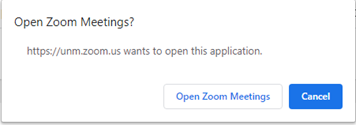
Click on “Open Zoom Meetings”
A window will pop-up, to enter your name (you can select the check-box to “Remember my name for future meetings”, after you enter your name click Join Meeting:
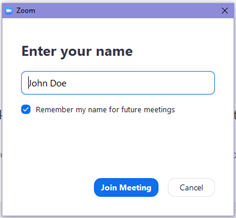
On the next window click on “Join with Computer Audio”
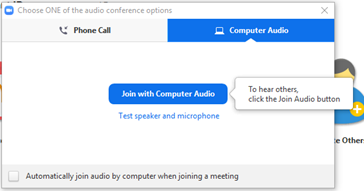
Features while you are in a meeting:
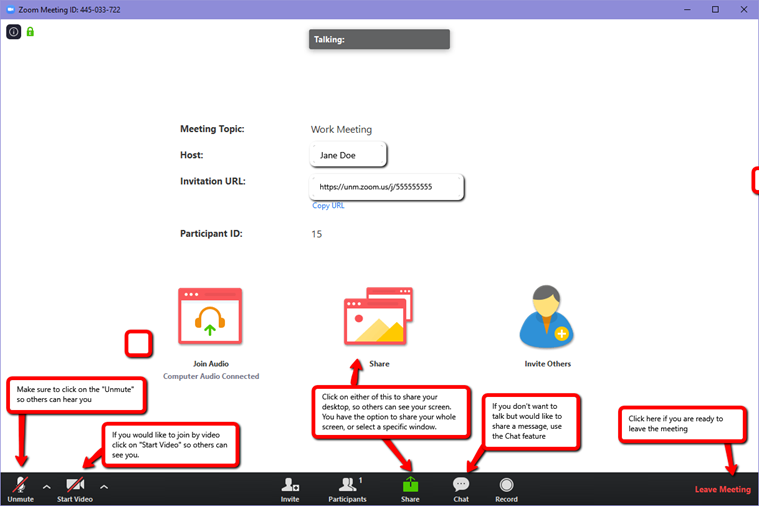
To minimize background noise, please remain on “mute” when you are not speaking.
Join a meeting by phone:
- Dial an in-country number. If you dial a toll number, your carrier rates will apply.
- You will be prompted to enter the meeting ID - the nine (9), ten (10), or eleven (11) digit ID provided to you by the host, followed by #.
- If the meeting has not already started and join before host is not enabled, you will be prompted to enter the host key to start the meeting, or to press # to wait if you are participant.
- You will be prompted to enter your unique participant ID. Press # to skip.
Phone controls for participants
The following commands can be entered via DTMF tones using your phone's dial pad while in a Zoom meeting:
- *6 - Toggle mute/unmute
- *9 - Raise hand.
Self-selecting a breakout room:
The host will allow participants to self-select and join breakout rooms of their choosing, participants will be able to view and select from a list of breakout rooms the host has created. They will be able to enter and leave breakout rooms freely.
Note: Participants not joined with the desktop or mobile app (version 5.3.0 or higher) will not be able to self-select a breakout room. The host will need to facilitate moving these participants manually.
- Click the Breakout Rooms option in your meeting controls.

This will display the list of open breakout rooms created by the host. - Click Join next to the Breakout Room you wish to participant in, then confirm by clicking Join again.
- Repeat as necessary to join other breakout rooms or click Leave Room to return to the main session.
Asking for help:
If you click Ask for Help, it will notify the meeting host that you need assistance, and they will be asked to join your breakout room.
- Click Ask for Help in the meeting controls.
